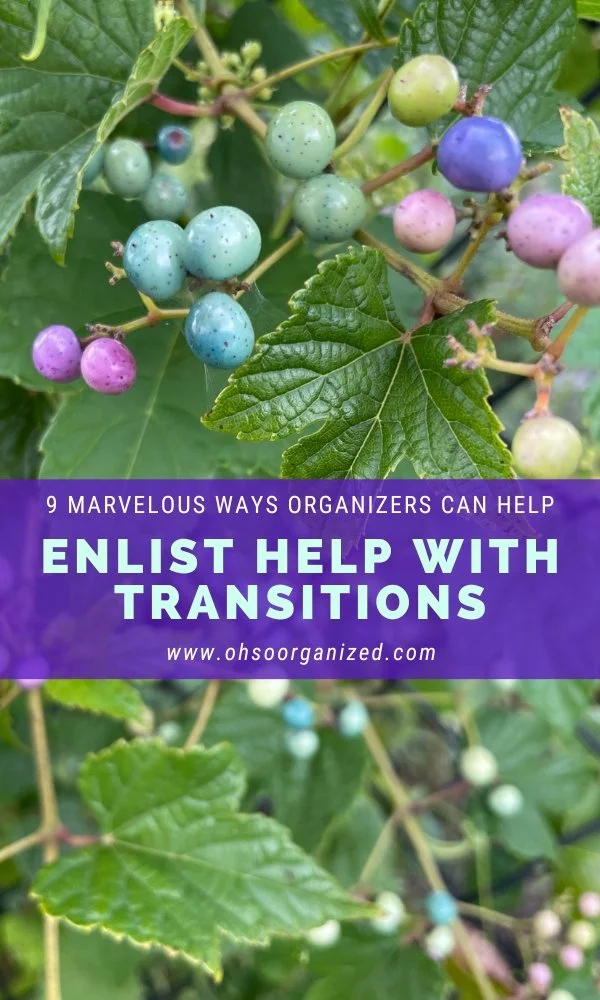Can you feel it? Transitions are in the air. The summer is coming to a close. Fall is around the corner, and change is on its way. One transition signal I noticed on a recent walk was the appearance of these beautiful berries that start white and turn to blue and purple hues. Oh, yes. Fall is coming. The transition is happening.
How do you feel about transitions? Are you excited, optimistic, empowered, sad, scared, apprehensive, or overwhelmed? Change can be challenging. You let go or say goodbye to what was and move forward to something different. The ‘different’ could be an unknown, a new stage of life, or a smaller, seemingly insignificant change. Navigating transitions can be much easier when you get planning, implementing, and supporting help.
Here's the good news. Many people can provide support, including friends, family members, colleagues, or virtual professional organizers like me. Much of my work centers around helping people of all ages and stages during their life transitions.
9 Ways Organizers Can Help With Transitions
1. Resetting for the New Season
Can you enlist the help of an organizer to do a clothing edit and organization? As you store your spring/summer clothes and bring out your fall/winter ones, choose the items you will no longer wear and can release. Could you hire an organizer to support your decision-making and organizational ideas? Your seasonal clothing transition will go more smoothly.
2. Going Back to School
You had one pattern for the summer, but now it’s time for the kiddos to return to school. This is a transition time where habits and schedules change. An organizer can help you create great organizational systems that work for your family.
3. Becoming an Empty Nester
Perhaps going back to school means you’re now an empty nester. This is an enormous transition for both you and your kiddo. If you need help getting your college-bound kid organized to leave the nest or need help reorganizing your home and schedule now that your kid is out, enlist help from a professional organizer.
4. Becoming a Parent
When a new life arrives, everything changes. You will prepare emotionally and physically during this transition. You can use the services of an organizer to help create an organized space for your little one.
5. Changing a Relationship
Whether you are moving in with your partner, getting married, or divorced, these transitions can be stressful and complicated. There are emotional aspects to navigate. There are also scheduling and space transitions, which an organizer can be especially helpful with. Whether merging two households into one or dividing one home into two, it’s beneficial to have a non-judgmental, compassionate person to plan, organize, and navigate this transition.
“Transitions are an opportunity for growth, renewal, and possibilities.”
6. Moving and Downsizing
Moving and downsizing are significant transitions. This can be anxiety-producing, especially if you work with a tight deadline or do not want to move. There are many things to handle, even when your deadline is flexible, or you’ve purposely chosen the change. Hiring an organizer to help you plan, support your decisions, and share resources can ease the stress of these complex transitions.
7. Retiring
You worked a lifetime, and now you’re ready to stop. You’re used to being highly scheduled with less free time to pursue hobbies and friendships. As you transition into this new stage of life, consider what you want and no longer need. What can you let go of? What do you want to make space for? You can work with an organizer to figure out what ‘belongs’ now.
8. Experiencing Health Challenges
While you have your medical health professionals’ support team, an organizer can help with health-related transitions in many ways. Perhaps you need a system for documenting doctor visits, instructions, or medications. Maybe you need to reorganize space in your home, declutter, or create an unobstructed flow. Especially when you’re not feeling your best, having another person to support your transition and organizational needs can be helpful.
9. Losing a Loved One
When someone we love dies, life changes instantly. It doesn’t matter if it is expected or not. Loss is loss. Everyone grieves in their way. At a point when the grief fog lifts, you might feel ready to make changes, like rethinking the use of rooms or letting go of some of your loved one's belongings. This is a highly emotional time. Having an organizer to work with can help you honor your loved one’s possessions as you organize, let go, and move forward.
As Tom Stoppard said, “Every exit is an entry somewhere.” As you travel from where you are to where you are heading, don’t go it alone. Gather your team who will help, support, and be there as you navigate. Transitions are an opportunity for growth, renewal, and possibilities.
Are you going through a transition? Who is on your team? Do you want additional help? I’d love to hear your thoughts. I invite you to join the conversation.











